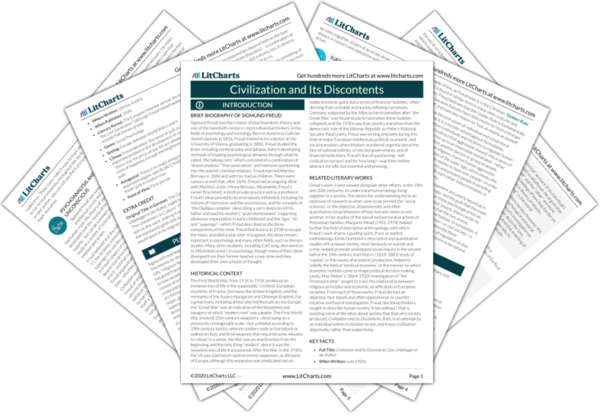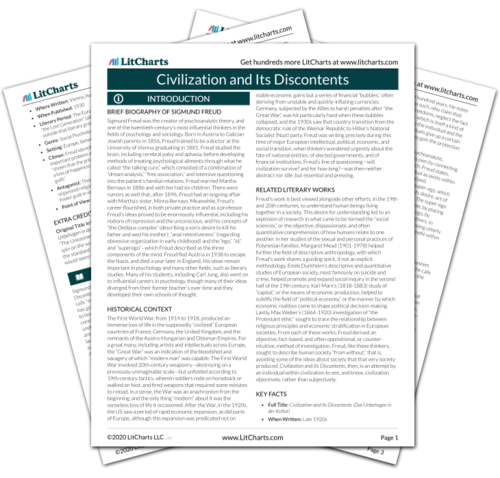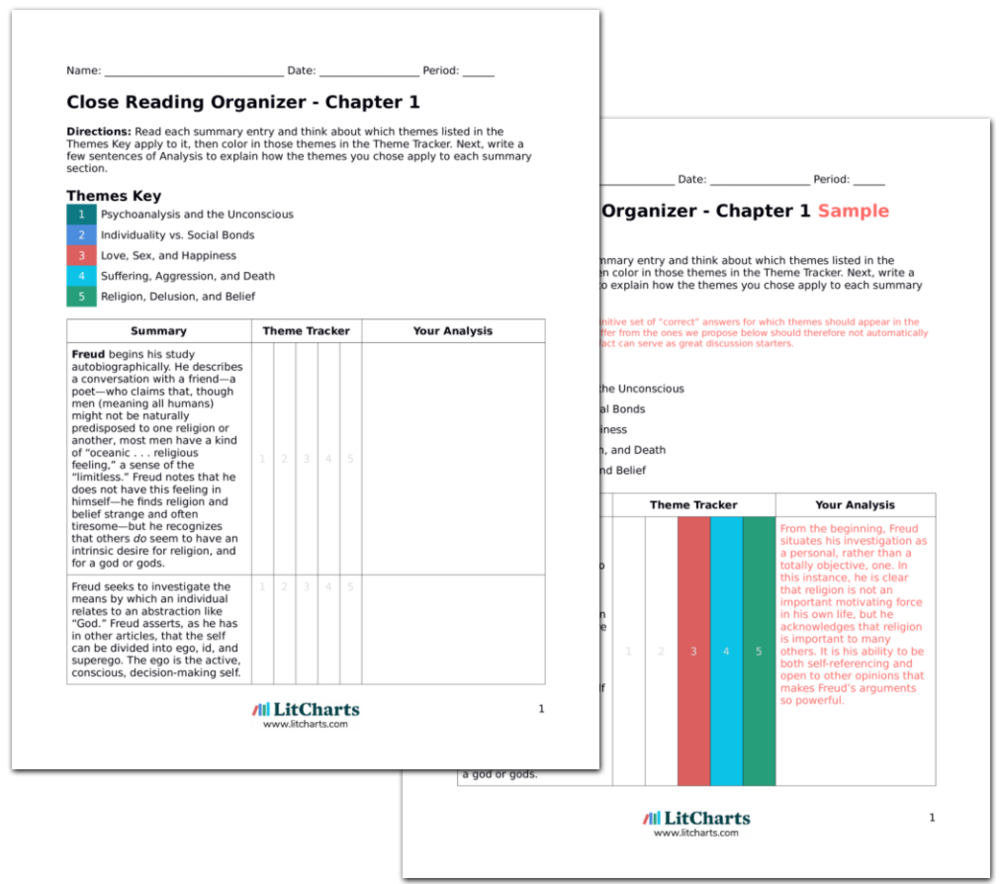![]()
LitCharts assigns a color and icon to each theme in Civilization and Its Discontents, which you can use to track the themes throughout the work.
![]()
![]()
![]()
![]()
![]()
Freud begins the final chapter by defining guilt “as the most important problem in the development of civilization” and attempting to “show that the price we pay for our advance in civilization is a loss of happiness through the heightening of the sense of guilt.” Freud goes on to explain that the consciences of individuals—that is the patrolling of their super-egos through the accumulated weight of social rules for behavior—cause individuals to suffer, rather to thrive, within many civilizations.
As with neurotics, whose sublimation of anxieties goes “overboard” and causes suffering, those who are guilt-ridden can be excessively guilty, and can therefore create a net negative, rather than positive, in society. Societies function best, Freud argues, when the superego of both individuals and the group maintains a productive level of guilt – one that knits people together without suffocating them.
Active Themes![]()
![]()
![]()
![]()
Freud then revisits many of his previous claims, arguing that human guilt is really a feeling of aggressiveness—which ultimately derives from the human death-drive—directed inwardly. This aggression, which society seeks to control in its outward manifestation (that is, against other individuals in society) can nevertheless very much harm the individual toward whom it is directed internally. In this way, societies, though attempting to make individuals less violent and to protect people, result in individuals inflicting violence on themselves, through the control of the super-ego.
Freud restates the major arguments of the book in this section. It is worth noting that Freud’s argument has proceeded more or less organically—although it is organized into chapters, Freud allows it to flow from one idea to the next. He restates his thoughts, qualifies them, and develops them over the course of many chapters. The result is, in the literal sense, an “essay”—an attempt or trial— of an argument about the nature of civilized societies.
Active Themes![]()
![]()
![]()
![]()
![]()
Freud also notes that, in the development of humans, two impulses are at play: the egoistic, or self-motivated, and the altruistic, or generous (the motivation to help another being). For individuals, self-motivation outstrips motivation to help others. But in societies, the altruistic impulse is championed over the egoistic, because societies value unity and agreement over individual aims.
Freud here shows that the balance between the self and society will, in a civilized space, always tilt toward society, or the general good.—otherwise the individual will to power and aggression is too strong. Societies, in order to keep existing, will always need to counter this individual will with a collective value of agreement and concord.
Active Themes![]()
![]()
![]()
![]()
Freud ends his essay by wondering the extent to which the development of civilizations, over time, mimics the development of children into adults. For if Freud’s previous reasoning holds true, then societies age and mature just as humans do. Therefore, societies on the whole have “selves” that grow up, and, as a consequence, these societies also have “super-egos,” or mechanisms by which the desires of the society on the whole are regulated. This results in a kind of “super-conscience” patrolling all the persons living in a given community.
Freud offers some speculation at the close of the piece. Here, he asks whether societal development maps onto human development exactly – and, if so, he asks what particular stage of development the West is in now (in the 1930s). It would be tempting to have said, then, that the West was in decline, and this was indeed a fashionable idea in the lead-up to WWII. Freud, however, is not convinced of exactly where on the spectrum of “rise” and “fall” European societies lie.
Active Themes![]()
![]()
![]()
![]()
![]()
"My students can't get enough of your charts and their results have gone through the roof." -Graham S.

If societies can have super-egos, then, societies can also feel guilty for their collective actions, and can become neurotic, or overly aggressive in their internal disciplining, when they become so guilty that they cannot function normally. Freud asks what a societal neurosis might look like. What would it would mean for a society to become so guilty over its collective “aggressions” and “instincts” that it sickened itself, and desired to punish itself for its actions?
Freud ends the piece with this grand and haunting question: what does a “sick” society do? And how can it be cured? In this way, Freud has played the role of medical doctor throughout the essay, attempting to diagnose the ills of society. But he is a doctor who is unsure of the cure – and who wonders if a cure is even possible for all of civilization.
Active Themes![]()
![]()
![]()
![]()
![]()
Freud ends the essay by implying that the rise of National Socialism in Germany and its neighboring countries in Europe might in fact be the social result of a neuroticism within a society. In Germany during the 1920s and 30s, self-discipline of a community became so intense that it turned its aggression outward against other peoples (as, in the case of National Socialism, Europe’s Jewish populations). The essay ends on this somber and prophetic note—and Freud died in 1939, before the horrors of the Second World War were fully revealed.
There was little reason to be happy about the state of Western civilization at the time the essay was composed. National Socialism in Germany and Fascism in Italy represented dictatorial responses to the economic and political turmoil of the time. These societies therefore privileged absolute government control over the rights of citizens: an imbalance between the liberties of the self and the regulations of the government, as Freud has explained throughout the essay. In such a society the superego has too much control in suppressing the ego, and so the society itself becomes neurotic and “sick.”
Active Themes![]()
![]()
![]()
![]()
![]()

“Would not have made it through AP Literature without the printable PDFs. They're like having in-class notes for every discussion!”
Get the Teacher Edition
“This is absolutely THE best teacher resource I have ever purchased. My students love how organized the handouts are and enjoy tracking the themes as a class.”
Copyright © 2024 All Rights Reserved Save time. Stress less.AI Tools for on-demand study help and teaching prep.
 Quote explanations, with page numbers, for over 44,324 quotes.
Quote explanations, with page numbers, for over 44,324 quotes. PDF downloads of all 2,003 LitCharts guides.
PDF downloads of all 2,003 LitCharts guides. Expert analysis to take your reading to the next level.
Expert analysis to take your reading to the next level. Advanced search to help you find exactly what you're looking for.
Advanced search to help you find exactly what you're looking for.
 Expert analysis to take your reading to the next level.
Expert analysis to take your reading to the next level. Advanced search to help you find exactly what you're looking for.
Advanced search to help you find exactly what you're looking for.